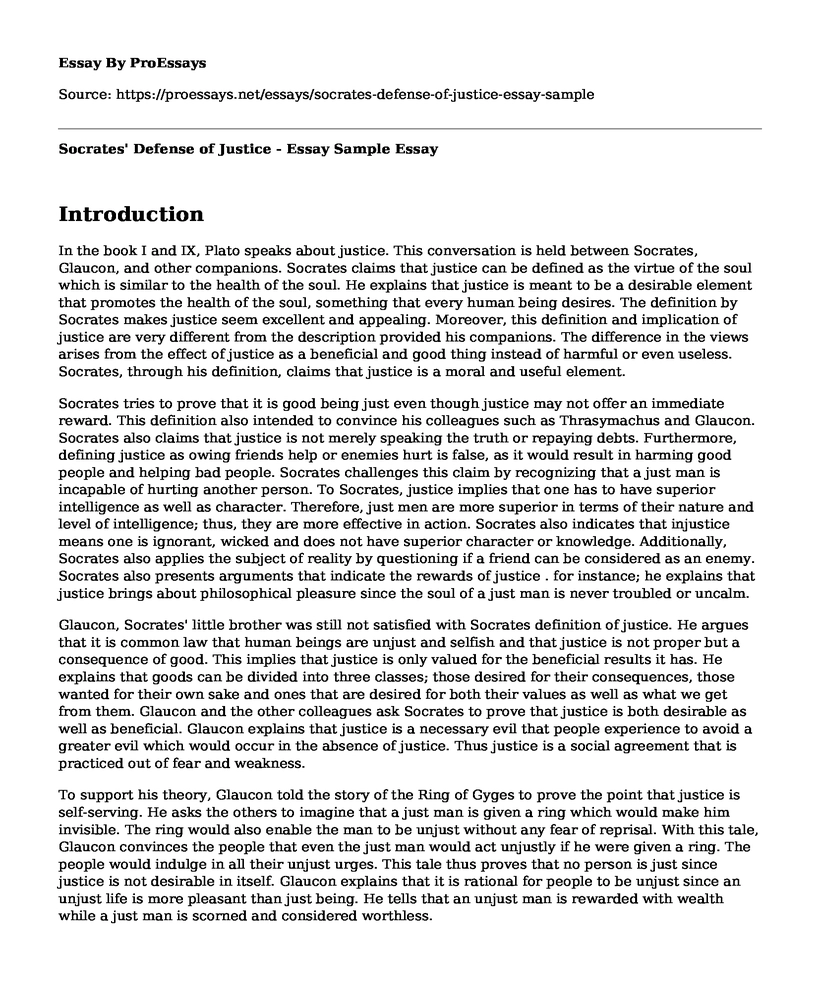Introduction
In the book I and IX, Plato speaks about justice. This conversation is held between Socrates, Glaucon, and other companions. Socrates claims that justice can be defined as the virtue of the soul which is similar to the health of the soul. He explains that justice is meant to be a desirable element that promotes the health of the soul, something that every human being desires. The definition by Socrates makes justice seem excellent and appealing. Moreover, this definition and implication of justice are very different from the description provided his companions. The difference in the views arises from the effect of justice as a beneficial and good thing instead of harmful or even useless. Socrates, through his definition, claims that justice is a moral and useful element.
Socrates tries to prove that it is good being just even though justice may not offer an immediate reward. This definition also intended to convince his colleagues such as Thrasymachus and Glaucon. Socrates also claims that justice is not merely speaking the truth or repaying debts. Furthermore, defining justice as owing friends help or enemies hurt is false, as it would result in harming good people and helping bad people. Socrates challenges this claim by recognizing that a just man is incapable of hurting another person. To Socrates, justice implies that one has to have superior intelligence as well as character. Therefore, just men are more superior in terms of their nature and level of intelligence; thus, they are more effective in action. Socrates also indicates that injustice means one is ignorant, wicked and does not have superior character or knowledge. Additionally, Socrates also applies the subject of reality by questioning if a friend can be considered as an enemy. Socrates also presents arguments that indicate the rewards of justice . for instance; he explains that justice brings about philosophical pleasure since the soul of a just man is never troubled or uncalm.
Glaucon, Socrates' little brother was still not satisfied with Socrates definition of justice. He argues that it is common law that human beings are unjust and selfish and that justice is not proper but a consequence of good. This implies that justice is only valued for the beneficial results it has. He explains that goods can be divided into three classes; those desired for their consequences, those wanted for their own sake and ones that are desired for both their values as well as what we get from them. Glaucon and the other colleagues ask Socrates to prove that justice is both desirable as well as beneficial. Glaucon explains that justice is a necessary evil that people experience to avoid a greater evil which would occur in the absence of justice. Thus justice is a social agreement that is practiced out of fear and weakness.
To support his theory, Glaucon told the story of the Ring of Gyges to prove the point that justice is self-serving. He asks the others to imagine that a just man is given a ring which would make him invisible. The ring would also enable the man to be unjust without any fear of reprisal. With this tale, Glaucon convinces the people that even the just man would act unjustly if he were given a ring. The people would indulge in all their unjust urges. This tale thus proves that no person is just since justice is not desirable in itself. Glaucon explains that it is rational for people to be unjust since an unjust life is more pleasant than just being. He tells that an unjust man is rewarded with wealth while a just man is scorned and considered worthless.
Instead of providing an answer, Socrates provides a bigger picture in which he asks everyone to imagine that every person is born with three animals inside of him. The animals include a multi-headed beast, a human and a lion. Socrates explains that if a man behaves unjustly, then he feeds the lion and the beast. Therefore, he makes them strong while at the same time weakening the human side. This makes the human side weak, and it is dragged wherever the stronger parts go. Socrates also points out that the three animal enemies that cannot coincide. However, if a man is just, the human side has control and takes care of the beast like a farm animal. This action domesticates the beast and prevents the natural ones from emerging. The human side also makes the lion his ally, and the three animals are friends.
Socrates, from the image, identifies that it is best if every person is ruled by divine reason. This reason, in an ideal situation, arises from within a person. However, the idea can also be imposed from the external forces such as laws. Laws, according to Socrates helps the people by imposing logic to those whose rational part is not strong enough to govern the soul. Therefore, Socrates provides the audience with a compelling reason to believe that justice is worthwhile as someone who exercises justice for all is happier than the unjust.
Cite this page
Socrates' Defense of Justice - Essay Sample. (2022, Dec 16). Retrieved from https://proessays.net/essays/socrates-defense-of-justice-essay-sample
If you are the original author of this essay and no longer wish to have it published on the ProEssays website, please click below to request its removal:
- Should Private Security Personnel Have a Stronger Background in Business or Criminal Justice?
- Research Paper Example on Validation of Forensic Tools
- Providing High-Quality Food Services for Inmates in Detention or Correctional Facilities Proposal
- Paper Example on Undocumented Immigration and Healthcare
- Abortion: Ethical Theories and Principles Essay
- Research Paper on Gary Ridgeway the Green River Killer
- Essay Sample on Evil in World Religions: Defining Good and Bad







